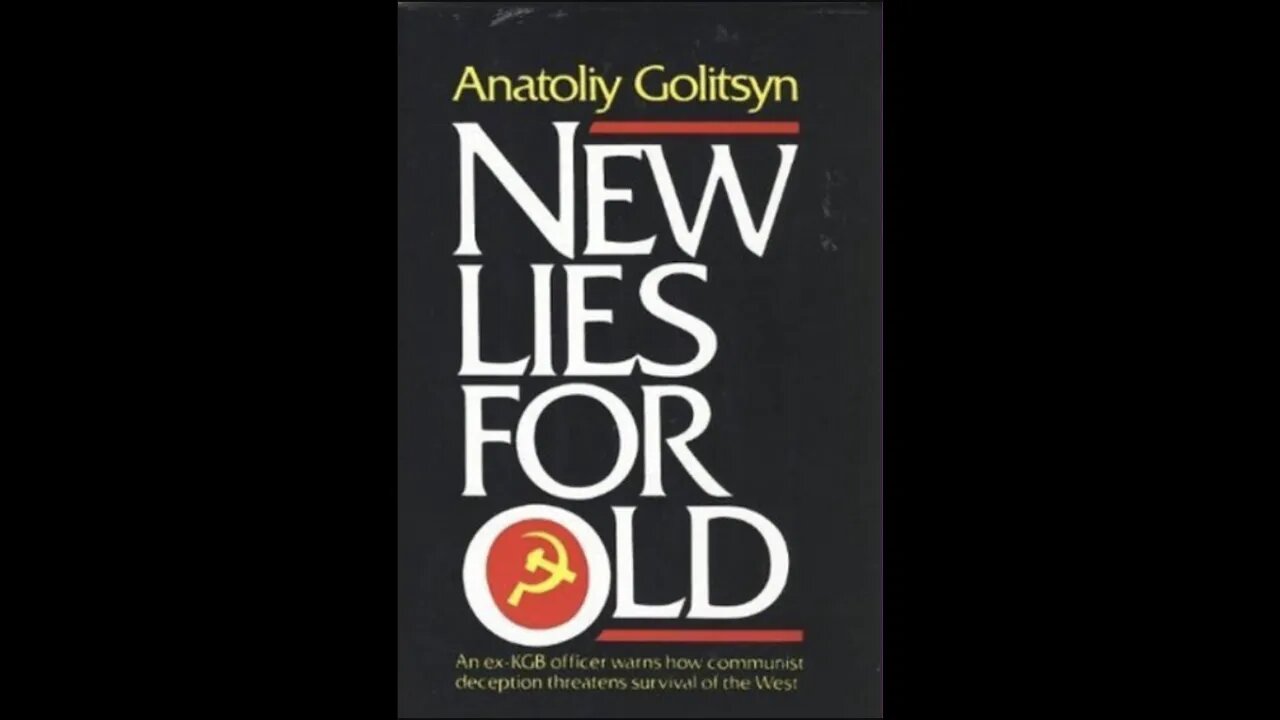Premium Only Content

Anatoliy Golitsyn – New Lies for Old – 16.2 – The Sino-Soviet "Split"
Support:
paypal.me/mario1337
BTC: 35iDtUzZq33CoJhmK38TdV9Xunvs7TKmzX
ETH: 0xf396A0e10911b4BC975CfE80117412D484B24d1e
Chapter 16: The Fourth Disinformation Operation: The Sino-Soviet "Split"
http://www.doomedsoldiers.com/pdfs/new_lies_for_old_golitsyn.pdf
162 — The Historical Evidence of Sino-Soviet Differences
163 — The Form of Sino-Soviet Differences
168 — The Content of Sino-Soviet Differences
168 — Ideological Differences
170 —Economic Differences
Notes
11. See CSP, vol. 3, p. 129: "in the U. S., I was asked many questions about the relations between the Soviet Union and China. I must assume that these questions derived from the revisionist anti-Chinese propaganda in the Yugoslav press which recently . . . published insinuations about incipient disagreements, if you please, between the Soviet Union and China. ... I replied that the gentlemen questioners were evidently dreaming sweet dreams in which, lo and behold, magic could cause disagreements to appear in the socialist camp between the Soviet Union and China. But I said that . . . the dream was unrealisable.
12. "Imperialist, renegade and revisionist hopes of a split within the socialist camp are built on sand and doomed to failure. All the socialist countries cherish the unity of the socialist camp like the apple of their eye." (Manifesto)
13. "I want to emphasize our constant effort to strengthen the bonds of fraternal friendship with the CPC, with the great Chinese people. ... the friendship of our two great peoples, the unity of our two parties ... are of exceptional importance in the struggle for the triumph of our common cause. . . . The CPSU and the Soviet people will do their utmost to further increase the unity of our parties and our peoples, so as not only to disappoint our enemies but to jolt them even more strongly with our unity, to attain the realisation of our great goal, the triumph of communism." (Khrushshev's speech, January 6, 1961)
14. In his speech to the Twenty-first CPSU Congress (CSP, vol. 3, pp. 77-78), Chou En-lai said: "The Soviet Union and China are fraternal socialist countries . . . the close friendship of the peoples of our two countries is eternal and indestructible." In an interview published in Peking Review on November 8, 1960, he said, "The solidarity between the two great countries, China and the Soviet Union, is the bulwark of the defence of world peace. What the imperialists and all reactionaries fear the most is the solidarity of the socialist countries. They seek by every means to sow discord and break up this unity."
15. The Sino-Soviet Dispute, an article by Geoffrey Francis Hudson, Richard Lowenthal, and Roderick MacFarquhar which was published by the China Quarterly, 1961, p. 35.
16. A timely warning against false historical analogies was given by former leading American communist Jay Lovestone in testimony before the Internal Security Committee of the U. S. Senate Committee of the Judiciary on January 26 and February 2, 1961: "We must guard against the temptation to resort to historical analogies. Since Communist Russia and Communist China are bound together by this overriding common objective [communist conquest and transformation of the world], it would be dangerously false to equate their differences or jealousies with the hostility and clash of interests between Czarist Russia and pre-World War I China."
17. Kommunist, no. 5 (1964), p. 21.
18. Party Life, no. 10 (1964), p. 65.
19. Ibid., no. 7 (1964), p. 9.
20. Problems of Philosophy (October 1958).
21. See his speech at Leipzig on March 7, 1959, reprinted in World without Arms, World without Wars (Moscow: Foreign Languages Publishing House, 1960), vol. 1, p. 198: "Broad co-operation is developing between the sovereign countries of the socialist camp in every sphere of economic, public, political and cultural life. Speaking of the future, I believe that the socialist countries' further development will in all likelihood follow the line of consolidating the single world socialist economic system. The economic barriers that divided our countries under capitalism will be removed one after another, and the common economic basis of world socialism will be steadily strengthened, eventually making the question of boundaries pointless."
22. CSP, vol. 3, p. 188: "The thesis in Comrade N. S. Krushchev's report that "from the theoretical standpoint it would be more correct to assume that by successfully employing the potentialities inherent in socialism, the countries of socialism will enter the higher phase of communist society more or less simultaneously" will be of tremendous interest not only to Communists of the Soviet Union but also to Communists of all the socialist countries as well as Communists of the entire world.
23. Mende, China and Her Shadow, pp. 175-76, 338-39.
-
 56:07
56:07
Eugen Richter Audiobooks
2 years agoMutiny in Russia, War in Ukraine: A Panel Discussion • Jeff Nyquist, Trevor Loudon, Clare Lopez
551 -
 19:26
19:26
GritsGG
1 day agoChat Picked My Hair Color! All Pink Loadout & Operator Challenge!
22.6K4 -
 10:32
10:32
Nikko Ortiz
1 day agoFunniest Fails Of The Month
53.2K7 -
 1:27:34
1:27:34
TruthStream with Joe and Scott
4 days agoArchitect Richard Gage: 911 truths and more #482
27.8K7 -
 LIVE
LIVE
Lofi Girl
2 years agoSynthwave Radio 🌌 - beats to chill/game to
147 watching -
 56:48
56:48
The HotSeat
13 hours agoI'm NOT Sorry! Guns Aren’t the Problem—Godless Culture Is
32.3K30 -
 9:43
9:43
The Pascal Show
15 hours ago $0.52 earnedWHOA! Annunciation School Sh**ter Identified... Heartbreaking & Insane
4.98K2 -
 22:42
22:42
Liberty Hangout
9 hours agoCollege Democrats Say Gangs Are GOOD!
78.3K68 -
 2:14:50
2:14:50
Badlands Media
14 hours agoBadlands Media Fantasy Football Live Draft
46.4K1 -
 2:12:29
2:12:29
Inverted World Live
8 hours agoWe Are Time Travelers | Ep. 100
88.7K13